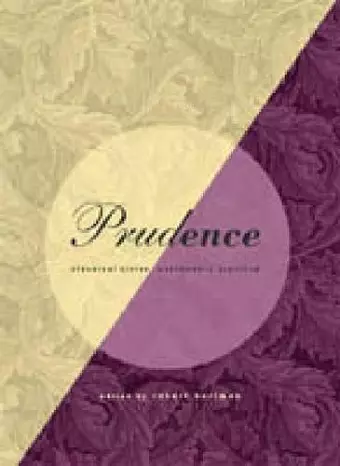Prudence
Classical Virtue, Postmodern Practice
Format:Hardback
Publisher:Pennsylvania State University Press
Published:19th Mar '03
Currently unavailable, and unfortunately no date known when it will be back
This hardback is available in another edition too:
- Paperback£37.99(9780271025278)

Realizing that a world remade by techno-science and global capital stands in great need of practical wisdom as an antidote to various forms of modern hubris, scholars across the human sciences have taken a renewed interest in exploring how the classical virtue of prudence can be reformulated as a guide for postmodern practice.
This volume brings together scholars in classics, political philosophy, and rhetoric to analyze prudence as a distinctive and vital form of political intelligence. Through case studies from each of the major periods in the history of prudence, the authors identify neglected resources for political judgment in today's conditions of pluralism and interdependency.
Three assumptions inform these essays: the many dimensions of prudence cannot be adequately represented in the lexicon of any single discipline; the Aristotelian focus on prudence as rational calculation needs to be balanced by the Ciceronian emphasis on prudence as discursive performance embedded in familiar social practices; and understanding prudence requires attention to how it operates through the communicative media and public discourses that constitute the political community.
Contributors, besides the editor, are Stephen H. Browne, Robert W. Cape Jr., Maurice Charland, Peter J. Diamond, Eugene Garver, James Jasinski, John S. Nelson, and Christine L. Oravec.
“The diversity of the subject matter and historical context might seem eclectic, but the volume is nonetheless more coherent than many collections of essays dealing with a single historical period. Not only does it remain focused throughout on the topic at hand, but its more rhetorical, less philosophical, perspective on prudence and practical wisdom gives it a definite cogency and originality. More importantly, one finds throughout an obviously sincere desire to investigate the relevance of prudence for our present state of affairs. His knowledge and mastery of the literature and various perspectives on prudence is impressive. His critical attitude is all the more praiseworthy in view of the fact that he never ‘gives in’ entirely to one contemporary theoretical perspective, be it the civic republicanism of a Beiner, the loftier logic of interpretation of a Gadamer (which he terms ‘bourgeois prudence’) or the ‘avant-garde prudence’ of post-structuralist thinkers such as Lyotard. As befits his subject, he is always conscious of limits and context. His ability to relate classical or early modern aspects of prudence to contemporary perspectives such as ecology (or the Monica Lewinsky scandal!) is also notable, through some more recent historical events might have been even better fodder for such analysis.”
—Jean-Francois Vallee Bryn Mawr Classical Review (BMCR)
“It is the great virtue of this book to give us a wider focus with more background and to remind us prudently of the full extent of our inheritance.”
—Francis A. Beer Philosophy and Rhetoric
“This excellent collection of essays appears at just the right moment. During the past two decades, interest in prudence has quickened and intensified in the humanities and qualitative social sciences, but previously we have had no systematic effort to deal with the topic on an interdisciplinary level. This collection fills the void and provides a valuable guide to the history of prudence and to its current status in a variety of academic disciplines.”
—Michael C. Leff, Northwestern University
“As the editor acknowledges, this volume neglects some standard topics important to a fully developed sense of prudence. What it provides instead is solid and original work that is an excellent accompaniment to more traditional treatments.”
—Karen Melham Religious Studies Review
ISBN: 9780271022550
Dimensions: 229mm x 152mm x 19mm
Weight: 626g
352 pages